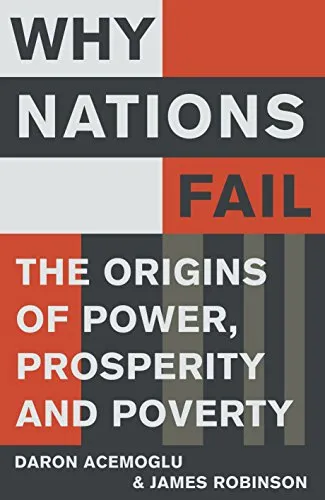Why Nations Fail: The Origins of Power, Prosperity and Poverty
4.5
بر اساس نظر کاربران

شما میتونید سوالاتتون در باره کتاب رو از هوش مصنوعیش بعد از ورود بپرسید
هر دانلود یا پرسش از هوش مصنوعی 2 امتیاز لازم دارد، برای بدست آوردن امتیاز رایگان، به صفحه ی راهنمای امتیازات سر بزنید و یک سری کار ارزشمند انجام بدینکتاب های مرتبط:
معرفی کتاب: چرا ملتها شکست میخورند: منشأ قدرت، ثروت و فقر
کتاب "چرا ملتها شکست میخورند: منشأ قدرت، ثروت و فقر" اثر دارون عجماوغلو و جیمز ای رابینسون، یکی از منابع برتر در زمینه تحلیل تاریخی و اقتصادی علل تفاوتهای عظیم در سطح رفاه و توسعه بین ملتهای مختلف جهان است. این کتاب با استفاده از مثالهای تاریخی و مطالعات موردی، نظریات جدیدی درباره دلایل موفقیت یا شکست کشورها ارائه میدهد و بر اهمیت نهادها در شکلگیری این تفاوتها تأکید میکند.
خلاصهای از کتاب
این کتاب به بررسی این موضوع میپردازد که چرا برخی ملتها ثروتمند و دیگران فقیرند. نویسندگان این مفهوم را معرفی میکنند که شکوفایی اقتصادی بر مبنای دوام و کیفیت نهادهای سیاسی و اقتصادی یک کشور استوار است. آنها نهادها را به دو دسته کلی "Inclusive" و "Extractive" تقسیم میکنند. نهادهای "Inclusive" که مشارکت گسترده اقتصادی و سیاسی را فراهم میکنند، موجب رشد و شکوفایی اقتصادی میشوند. در مقابل، نهادهای "Extractive" که در خدمت استخراج منابع و قدرت برای گروههای خاصی هستند، باعث رکود و شکست اقتصادی و سیاسی میشوند.
نکات کلیدی
- نهادهای سیاسی و اقتصادی نقش اصلی را در تعیین میزان توسعه جوامع ایفا میکنند.
- نهادهای "Inclusive" با ترویج آزادی و برابری، به توسعه پایدار منجر میشوند.
- نهادهای "Extractive" مانع رشد و توسعه میشوند زیرا تنها به نفع گروههای خاصی عمل میکنند.
- تاریخ ملتها نشان داده که تحولات بزرگ اقتصادی و اجتماعی معمولاً ناشی از تغییرات در ساختار نهادهای سیاسی و اقتصادی است.
جملات معروف از کتاب
"داستان فقر دنیا نه داستان تفاوت در فرهنگ یا جغرافیا، بلکه داستان نهادهاست."
"تاریخ ملتها یک مبارزهی دائمی بین نهادهای اقتصادی و سیاسی Extractive و Inclusive است."
اهمیت این کتاب
کتاب "چرا ملتها شکست میخورند" با تحلیل ریشهای و جامع خود از عوامل مؤثر در توسعه یا زوال ملتها، توجهات بسیاری را به خود جلب کرده است. این کتاب برای اقتصاددانان، سیاستمداران و محققان علوم اجتماعی اهمیت بسیاری دارد زیرا بینشی عمیق از چگونگی شکلگیری نابرابریهای اقتصادی و سیاسی ارائه میدهد. ایدههای مطرح شده در این کتاب میتواند به تصمیمگیریهای آگاهانهتر درباره سیاستگذاریهای اقتصادی و سیاسی کمک کند و با توجه به مثالهای واقعی، چشماندازهای جدیدی برای بهبود وضعیت جهانی ارائه نماید.
Introduction to "Why Nations Fail: The Origins of Power, Prosperity and Poverty"
Written by renowned economists Daron Acemoglu and James A. Robinson, "Why Nations Fail: The Origins of Power, Prosperity and Poverty" is a compelling exploration into the reasons behind the rich-poor divide among countries. This thought-provoking book leverages historical analysis, economic principles, and political theories to unravel the factors that lead to prosperity or poverty in different nations.
Detailed Summary of the Book
At its core, "Why Nations Fail" posits that it is not geography, culture, or values that determine the economic success or failure of a nation. Instead, it argues that the key factor is the nature of political and economic institutions. The authors make a powerful case for institutionalism, emphasizing that inclusive political institutions enable the establishment of inclusive economic institutions, which in turn foster innovation, safeguard property rights, and encourage investment. Contrarily, extractive institutions are constructed to extract wealth and resources for the benefit of an elite, leading to instability, corruption, and, ultimately, the failure of nations.
The book takes readers through compelling historical case studies, from the Neolithic Revolution to the Industrial Revolution, across continents from Latin America and Africa to the United States and Eastern Europe. These examples illustrate how the development and evolution of institutions play a critical role in shaping the economic destinies of nations.
Key Takeaways
1. Institutions Matter: Inclusive institutions are crucial for ensuring sustainable economic growth and prosperity. They empower individuals, fuel innovation, and provide opportunities across society.
2. The Role of Politics: Political power is integral in shaping economic outcomes. Democratic governance with checks and balances is often a precursor to successful economic institutions.
3. Innovation and Creative Destruction: Technological advancement and creative destruction drive progress and economic development, which are only possible under inclusive systems that embrace change and invention.
Famous Quotes from the Book
"Nations fail today because their extractive economic institutions do not create the incentives needed for people to save, invest, and innovate."
"Inclusive economic institutions foster economic activity, productivity growth, and economic prosperity."
Why This Book Matters
"Why Nations Fail" is a critical contribution to the discourse on global economic inequalities. By shedding light on the central role of institutions in shaping economic outcomes, the book challenges long-held assumptions about the determinism of geography, culture, or natural resources. It offers a paradigm shift in understanding economic development and provides actionable insights for policymakers seeking to foster sustainable growth and equality in their countries.
The book is not just an academic exploration; it's a call to action. It emphatically demonstrates that nations, through conscious design and political will, can change their trajectories regardless of initial conditions. This makes "Why Nations Fail" an indispensable resource for scholars, leaders, and anyone interested in the complexities that underlie global prosperity and poverty.
دانلود رایگان مستقیم
شما میتونید سوالاتتون در باره کتاب رو از هوش مصنوعیش بعد از ورود بپرسید
دسترسی به کتابها از طریق پلتفرمهای قانونی و کتابخانههای عمومی نه تنها از حقوق نویسندگان و ناشران حمایت میکند، بلکه به پایداری فرهنگ کتابخوانی نیز کمک میرساند. پیش از دانلود، لحظهای به بررسی این گزینهها فکر کنید.
این کتاب رو در پلتفرم های دیگه ببینید
WorldCat به شما کمک میکنه تا کتاب ها رو در کتابخانه های سراسر دنیا پیدا کنید
امتیازها، نظرات تخصصی و صحبت ها درباره کتاب را در Goodreads ببینید
کتابهای کمیاب یا دست دوم را در AbeBooks پیدا کنید و بخرید
1430
بازدید4.5
امتیاز50
نظر98%
رضایتنظرات:
4.5
بر اساس 0 نظر کاربران
"کیفیت چاپ عالی بود، خیلی راضیام"
Questions & Answers
Ask questions about this book or help others by answering
No questions yet. Be the first to ask!








